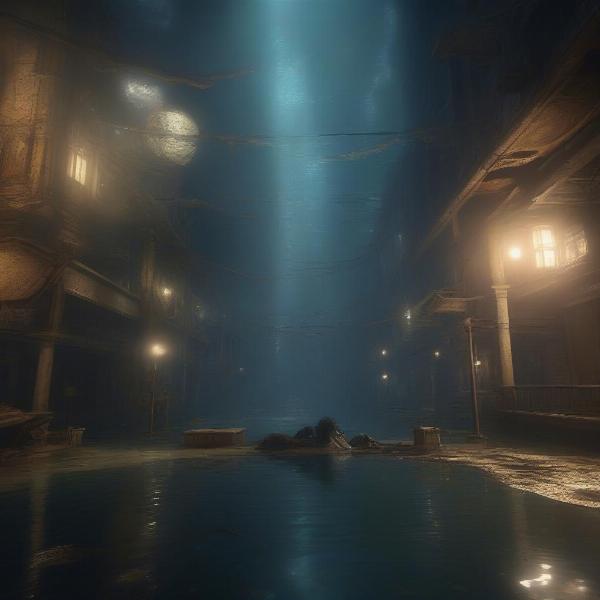Is Bioshock A Horror Game? This question has been debated among gamers for years. While it incorporates elements of horror, it also blends in action, RPG, and even steampunk aesthetics, making its genre classification complex and often a matter of personal interpretation.
Delving into the Depths of Rapture: BioShock’s Atmosphere
BioShock’s unsettling atmosphere undoubtedly contributes to the horror experience. The decaying underwater city of Rapture, with its leaking pipes, flickering lights, and haunting audio diaries, creates a constant sense of dread. The isolation and claustrophobia of being trapped in this underwater dystopia amplify the feeling of vulnerability. The grotesque Splicers, driven mad by ADAM, add a visceral layer of horror, their unpredictable movements and disturbing appearances making every encounter a tense moment.
The game’s sound design is masterful, using ambient noises and unsettling music to build suspense and keep players on edge. From the distant groans of the city to the chilling whispers of the Splicers, every sound contributes to the overall sense of unease.
 BioShock's Rapture Atmosphere: Decay and Despair
BioShock's Rapture Atmosphere: Decay and Despair
The Psychological Horror of BioShock
Beyond jump scares and grotesque imagery, BioShock delves into psychological horror. The game explores themes of free will, control, and the consequences of unchecked scientific ambition. The story of Andrew Ryan and his descent into madness, along with the tragic fates of the citizens of Rapture, adds a layer of depth and disturbing realism to the game.
The “Would You Kindly” twist is a pivotal moment in gaming history, forcing players to confront their own agency within the game’s narrative. This realization often leads to a sense of unease and discomfort, blurring the lines between player control and predetermined events. This psychological manipulation adds a layer of meta-horror that resonates with players long after the game is finished.
Is BioShock Survival Horror? A Genre Comparison
While BioShock certainly has horror elements, it’s not purely a survival horror game in the traditional sense. Unlike games like Resident Evil, where resource management and limited ammunition are key components, BioShock provides players with a wider arsenal and encourages a more action-oriented approach. The inclusion of RPG elements, such as character customization and upgradeable abilities, further distinguishes it from the classic survival horror formula.
However, the game expertly utilizes horror elements to enhance the gameplay experience. The constant sense of dread, the psychological manipulation, and the grotesque enemies all contribute to a horrifying atmosphere that permeates every aspect of the game.
The Influence of System Shock 2 on BioShock’s Horror
BioShock draws heavily from its spiritual predecessor, System Shock 2, a game widely considered a classic in the survival horror and immersive sim genres. Both games feature isolated environments, morally ambiguous narratives, and a focus on atmospheric horror. System Shock 2’s influence is evident in BioShock’s use of audio logs, environmental storytelling, and its exploration of themes of isolation and madness. This shared DNA strengthens BioShock’s horror credentials, linking it to a legacy of critically acclaimed horror games.
“The real horror in BioShock isn’t just the Splicers; it’s the realization of Rapture’s downfall and the consequences of Ryan’s unchecked idealism,” says Dr. Amelia Hughes, a video game historian specializing in narrative design. “It’s the horror of a society that crumbled from within, a chilling reminder of the dangers of unchecked power.”
BioShock Infinite: A Shift in Tone
BioShock Infinite, while sharing the same universe and gameplay mechanics, takes a slightly different approach to horror. While the floating city of Columbia initially presents a picturesque and utopian facade, the underlying themes of racism, nationalism, and religious extremism create a sense of unsettling dread. The game’s horror is less visceral and more focused on societal and political anxieties.
The Lasting Impact of BioShock’s Horror
Despite the debate surrounding its genre classification, BioShock’s impact on the horror landscape is undeniable. The game’s unique blend of atmospheric dread, psychological manipulation, and social commentary has resonated with players and influenced countless other games. Whether you consider it a full-fledged horror game or not, BioShock’s disturbing and thought-provoking narrative leaves a lasting impression.
“BioShock masterfully blends gameplay with narrative to create an immersive and unsettling experience,” comments James Carter, a game developer with over 15 years of experience in the industry. “The game’s exploration of complex themes and its masterful use of atmosphere create a unique brand of horror that sticks with you.”
Conclusion: Defining BioShock’s Place in Horror
Ultimately, the question of whether BioShock is a horror game is subjective. While it might not fit neatly into the survival horror box, its atmospheric tension, psychological elements, and grotesque imagery contribute to a genuinely unsettling experience. BioShock’s exploration of complex themes, combined with its masterful storytelling and immersive gameplay, solidifies its place as a significant contributor to the horror genre, reminding us that true horror can transcend genre classifications. So, is BioShock a horror game? Perhaps the better question is, does it scare you?

